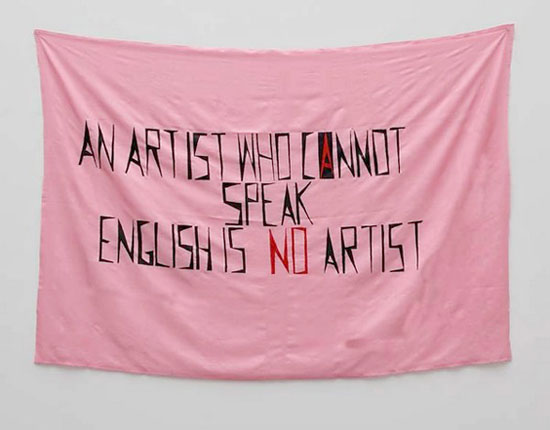 |
| Mladen Stilinović, An Artist Who Cannot Speak English Is No Artist, 1992, in Hito Steyerl's article on International Disco Latin |
Dear Ignacio
I’m ignorant about the uses of lexica for Renaissance or Medieval art. I didn't study art history, so I have no clue and I wonder if this is a liberating condition for my writing on contemporary art or a restricting one.
When I entered in the contemporary art world seven years ago, which words did I learn? I don’t remember. The vocabulary must have slipped in unconsciously or I like to think my writing is free from art speak and my language is as clear as a drop of water, the same as my ideas :-)
The language of art speak is a foremost white (male) language, isn’t it, rooted in categorizations made by the politics of white patriarchal exclusion and with every categorization there’s a value and hierarchy that goes along with it.
Language is political and can be aggressive on a daily level. I get upset when art professionals use words like “old women” in their reviews or when an exhibition about art from 1933-1944 is called "The Black Years".
Hito Steyerl wrote a nice essay about getting rid of International Art English, and she proposed an alternative called International Disco Latin. It sounds like a really great language, so I’m going to give you a full quote:
“a language that is not policed by formerly imperial, newly global corporations, nor by national statistics—a language that takes on and confronts issues of circulation, labor, and privilege (or at least manages to say something at all), a language that is not a luxury commodity nor a national birthright, but a gift, a theft, an excess or waste, made between Skopje and Saigon by interns and non-resident aliens on Emoji keyboards.”
International Disco Latin is a language of accents. English is not my mother tongue. This means that the sound of my writing must have an accent. Maybe even its way of reasoning is a bit off, a bit un-English. I like the idea of writing in a language with accents, but I’m incapable to enjoy mine, because in my eyes my English is impeccable and it’s only when a native speaker edits it that it dawns on me, and only in a negative way.
I'm struck by something I read today in a new online magazine called The Trans-African. According to Emmanuel Iduma “language is always superfluous in relation to images,” and he argues:
“Yet it is through superfluity we gain access to images in the colonial archive, now and always. Today, the language of collective thinking about the past could be provisional, lacking the condescending specificity at the heart of photographs in the colonial archive. A provisional response, which suggests the possibility of revisions, of repeatedly making room for clarity, is in my mind an empathetic stance in relation to images. This is something writing makes possible. Texts, unlike the colonial photographs, do not serve as evidence. What they lack in finality they gain in nuance. By probing.”
Writing as a way of provisional probing. I find this a most beautiful idea. Do you agree, Ignacio, that language is always superfluous in relation to images?
Yours,
An